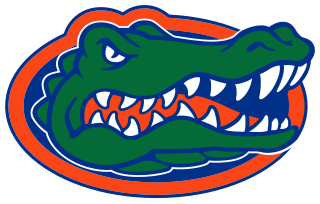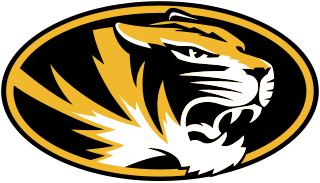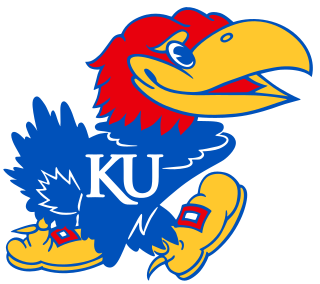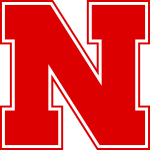
The North Central Conference (NCC), also known as North Central Intercollegiate Athletic Conference, was a college athletic conference which operated in the north central United States. It participated in the NCAA's Division II.

The Nebraska Cornhuskers are the intercollegiate athletic teams that represent the University of Nebraska–Lincoln. The university is a member of the Big Ten Conference and competes in NCAA Division I, fielding twenty-four varsity teams in fifteen sports. Nineteen of these teams participate in the Big Ten, while rifle is a member of the single-sport Patriot Rifle Conference and beach volleyball and bowling compete as independents. The Cornhuskers have two official mascots, Herbie Husker and Lil' Red.

The Florida Gators are the intercollegiate athletic teams that represent the University of Florida, located in Gainesville. The University of Florida, its athletic program, its alumni and its sports fans are often collectively referred to as the "Gator Nation." The Gators compete in the National Collegiate Athletic Association (NCAA) and the Southeastern Conference (SEC) and are consistently ranked among the top college sports programs in the United States. The University of Florida currently fields teams in nine men's sports and twelve women's sports.
The Oklahoma Sooners are the athletic teams that represent the University of Oklahoma, located in Norman. The 19 men's and women's varsity teams are called the "Sooners", a reference to a nickname given to the early participants in the Land Run of 1889, which initially opened the Unassigned Lands in the future state of Oklahoma to non-native settlement. The university's athletic teams compete in the National Collegiate Athletic Association (NCAA)'s Division I in the Southeastern Conference (SEC). The university's current athletic director is Joe Castiglione.

The Missouri Tigers intercollegiate athletics programs represent the University of Missouri, located in Columbia. The name comes from a band of armed Union Home Guards called the "Fighting Tigers of Columbia" who, in 1864, protected Columbia from Confederate guerrillas during the American Civil War.

The Texas Longhorns are the athletic teams representing the University of Texas at Austin. The teams are sometimes referred to as the Horns and take their name from Longhorn cattle that were an important part of the development of Texas, and are now the official "large animal" of the state of Texas. Generally, both the men's and women's teams are referred to as the Longhorns, and the mascot is a Texas Longhorn steer named Bevo. The Longhorns have consistently been ranked as the biggest brand in collegiate athletics, in both department size and breadth of appeal.

The Kansas Jayhawks, commonly referred to as simply KU or Kansas, are the athletic teams that represent the University of Kansas. KU is one of three schools in the state of Kansas that participate in NCAA Division I. The Jayhawks are also a member of the Big 12 Conference. KU athletic teams have won fifteen national championships all-time, with twelve of those being NCAA Division I championships: four in men's basketball, one in men's cross country, three in men's indoor track and field, three in men's outdoor track and field, and one in women's outdoor track and field. Kansas basketball also won two Helms Foundation National Titles in 1922 and 1923, and KU Bowling won the USBC National Title in 2004.

The Kansas State Wildcats are the intercollegiate athletic teams that represent Kansas State University. The official color of the teams is Royal Purple; white and silver are generally used as complementary colors.

The UCLA Bruins are the athletic teams that represent the University of California, Los Angeles. The Bruin men's and women's teams participate in NCAA Division I as part of the Big Ten Conference and the Mountain Pacific Sports Federation (MPSF). For football, they are in the Football Bowl Subdivision of Division I. UCLA is second to only Stanford University as the school with the most NCAA team championships at 124 NCAA team championships. UCLA offers 11 varsity sports programs for men and 14 for women.
The Arizona State Sun Devils are the athletic teams that represent Arizona State University. ASU has nine men's and eleven women's varsity teams competing at the National Collegiate Athletic Association (NCAA) Division I level as a member of the Big 12 Conference. The mascot was adopted in 1946; earlier nicknames were the Normals and later, the Bulldogs. The Sun Devil mascot, Sparky, was designed by Bert Anthony, a former Disney illustrator. ASU's chief rival is the University of Arizona Wildcats, and both universities' athletics departments compete against each other in the Territorial Cup Series.

The Texas A&M Aggies are the students, graduates, and sports teams of Texas A&M University. The nickname "Aggie" was once common at land-grant or "ag" (agriculture) schools in many states. The teams are also simply referred to as "A&M" or "Texas Aggies," and the official school colors are maroon and white. The mascot is a rough collie named Reveille.

The Colorado Buffaloes football program represents the University of Colorado Boulder in college football at the NCAA Division I FBS level, and is a member of the Big 12 Conference. The team was a charter member of the Big 12 before leaving to join the Pac-12 Conference after the 2010 season. After 13 seasons in the Pac-12, the Buffaloes returned to the Big 12 in 2024. Before joining the Big 12, they were members of the Big Eight Conference. The CU football team has played at Folsom Field since 1924. The Buffs all-time record is 716–520–36 as of the 2022 season. Colorado won the 1990 National Championship. The football program is 27th on the all-time win list and 40th in all-time winning percentage.

The South Carolina Gamecocks represent the University of South Carolina in the NCAA Division I.

The Middlebury Panthers are the 31 varsity teams of Middlebury College that compete in the New England Small College Athletic Conference. The Panthers lead the NESCAC in total number of national championships, having won 42 team titles since the conference lifted its ban on NCAA play in 1994. Middlebury enjoys national success in soccer, cross country running, field hockey, men's basketball, women's hockey, skiing, men's lacrosse and women's lacrosse, and fields 31 varsity NCAA teams and several competitive club teams including a sailing team (MCSC), a crew team, a water polo team, an ultimate frisbee team, and a rugby team. Since 2000, Middlebury's varsity squads have won 84 NESCAC titles. Currently, 28% of students participate in varsity sports.

The Portland Pilots is the nickname for athletics at the University of Portland. The Pilots compete in the West Coast Conference (WCC) at the NCAA Division I level.
The Mount Union Purple Raiders football program represents the University of Mount Union in college football at the NCAA Division III level as members of the Ohio Athletic Conference (OAC). Mount Union have played their home games at Mount Union Stadium in Alliance, Ohio since 1913, which makes it the oldest college football stadium in Ohio. The Purple Raiders have claimed 13 NCAA Division III Football Championship and 35 OAC titles and have 12 undefeated seasons.

The Montevallo Falcons are the athletic teams that represent the University of Montevallo, in Montevallo, Alabama, in intercollegiate sports at the Division II level of the National Collegiate Athletic Association (NCAA). The Falcons have primarily competed in the Gulf South Conference since the 2017–18 academic year. Rivals include West Alabama, Auburn Montgomery, Alabama–Huntsville, and North Alabama.

The Western Colorado Mountaineers are the athletic teams that represent Western Colorado University, located in Gunnison, Colorado, in NCAA Division II intercollegiate sports. The Mountaineers compete as members of the Rocky Mountain Athletic Conference for all 11 varsity sports.

The North Georgia Nighthawks are the athletic teams that represent the University of North Georgia, located in Dahlonega, Georgia, in intercollegiate sports at the Division II level of the National Collegiate Athletic Association (NCAA), primarily competing in the Peach Belt Conference since the 2005–06 academic year. North Georgia's rifle team competes at the Division I level as affiliate members of the Southern Conference (SoCon).


















